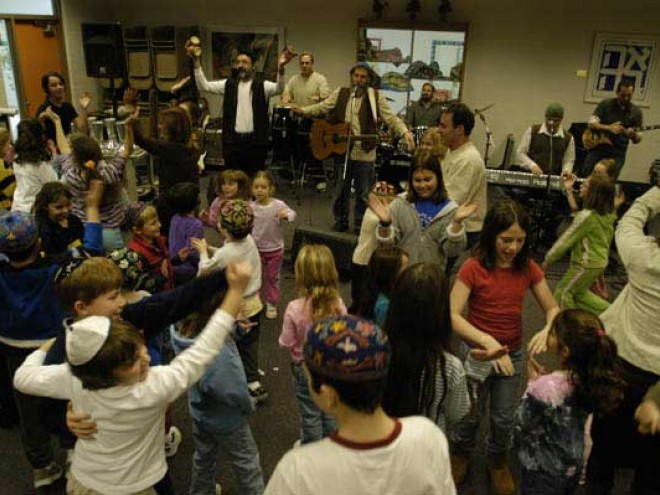
Following up on his children’s biography of Leonard Nimoy, Richard Michelson’s newest book for young readers The Language of Angels: A Story About the Reinvention of Hebrew comes out tomorrow! Richard is guest blogging for the Jewish Book Council all week as part of the Visiting Scribe series here on The ProsenPeople.
Child abuse! Had I lived in Jerusalem in the late nineteenth century, I would have undoubtedly joined the chorus of those charging Eliezer Ben-Yehuda with that crime.
Would I have considered the Maccabees religious zealots who deserved to be routed, or would I have joined their Chanukah celebration? Would I have accused Jesus of heresy or shared in his Passover feast?
History has a way of confounding your beliefs and expectations. I can only judge myself and others within my own timeframe, but I am certain that I would have disliked much about Eliezer Ben-Yehuda, especially the way he bullied those around him — his children, wives, friends — in pursuit of his own dreams. But… what dreams they were, to bring Hebrew back to life in our own time! To champion a language, for how can you have a homeland without a common language?
Ben-Yehuda was successful beyond his wildest expectations, surmounting insurmountable odds. When Eliezer arrived in Jerusalem in 1881, no one spoke Hebrew as their daily language. Neighbors spoke Arabic, Spanish, Turkish, English, and numerous other dialects. It was a regular city of Babel. Jews who immigrated spoke Yiddish, Ladino, or any one of the many languages they had learned in the country that they emigrated from. Jews who had never left their Holy Land considered Hebrew appropriate only for religious worship. To speak Hebrew in the bathroom? Unspeakable! Eliezer Ben-Yehuda was meshugge!
But during his lifetime, 55 schools opened with all instruction in Hebrew. Ben-Yehuda created the first Hebrew dictionary and coined words for countless ideas and objects that had not been in existence when Hebrew ceased to be a spoken language. To make up new words, he studied ancient languages related to Hebrew: Assyrian, Egyptian, Amharic, Coptic, and Arabic, which was then only Semitic language that had remained in use throughout the ages. Ben-Yehuda believed that Jews and Arabs were mishpacha— family — and should share the land and live together. He delivered a lecture at the Arabic Academy of Science and told his audience about the close linguistic relationship between Arabic and Hebrew. He explained how he had borrowed many words from Arabic, and that some Arabic words had been borrowed from Hebrew. Most Arabs respected him and were pleased to hear their “sister tongue” spoken in the markets.
In 1948 the State of Israel was established, and Hebrew was made the national language. Today more than three million people speak Hebrew every day.
But my story is about Ben-Zion Ben-Yehuda, the very first child in over 2,000 years to grow up with Hebrew as their first and, for a time, only language. He would hear ONLY Hebrew until he was five years old: that meant, of course, he couldn’t play with the other neighborhood children, and his father went so far as to cover Ben Zion’s ears when cows were mooing and dogs were barking. He forbade his wife, Devorah, from comforting her son with the Russian folk songs that she had grown up hearing.
Eliezer Ben-Yehude had a point to prove and his son was his experimental subject. When Ben Zion was four years old, he had yet to speak, and his mother was beside herself with worry. The neighbors mocked the crazy man in their midst. I’d have had him arrested for child abuse.
And yet… and yet the more I read, the more I fell in love with this madman. His passion for words and language, and his single-minded focus won me over. It helps, of course, that the son grew up to idolize the father, and become a man of words himself. Ben-Zion changed his name to Itamar Ben-Avi. Ben-Avi means “son of my father,” and like his father, he remained interested in words and language throughout his life. He wrote a biography of his father, as well as his own autobiography; he became a journalist and newspaper publisher.
Eliezer wanted all Jews to learn Hebrew so they could talk with one another, regardless of their origins, but Itamar wanted everyone in the world to be able to converse. He championed an international language called Esperanto, though with less success than his father. (In 1966, William Shatner — before he became Captain Kirk of Star Trek fame — starred in the Hollywood thriller Incubus, written and acted entirely in Esperanto. But that is another tale entirely, and we shouldn’t blame Itamar for that fiasco.)
After my book was completed I had the honor of corresponding with Ben-Yehuda’s grandson, a Florida-based rabbi who is also named Eliezer Ben-Yehuda, and also went into “the family business.” He wrote a biography of his grandfather, and as a writer and scholar he continues to champion his love of words and the Hebrew language. So I guess it a good thing that I wasn’t the one making the decision in the late nineteenth century about whether or not to toss the meshugeneh into jail.
Richard Michelson’s books have been named among the Ten Best of the Year by The New York Times, Publishers Weekly, and The New Yorker; He’s received a National Jewish Book Award (and twice finalist) and two Sydney Taylor Gold Medals (and two silver) from the AJL. Born in Brooklyn, Michelson lives in MA and owns R. Michelson Galleries.



